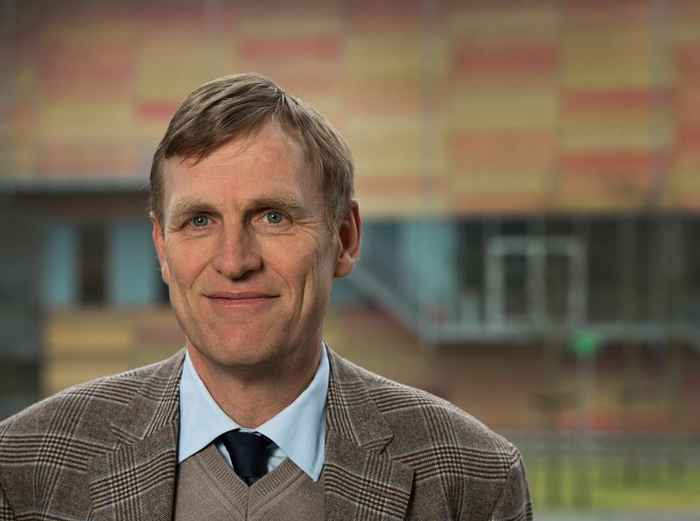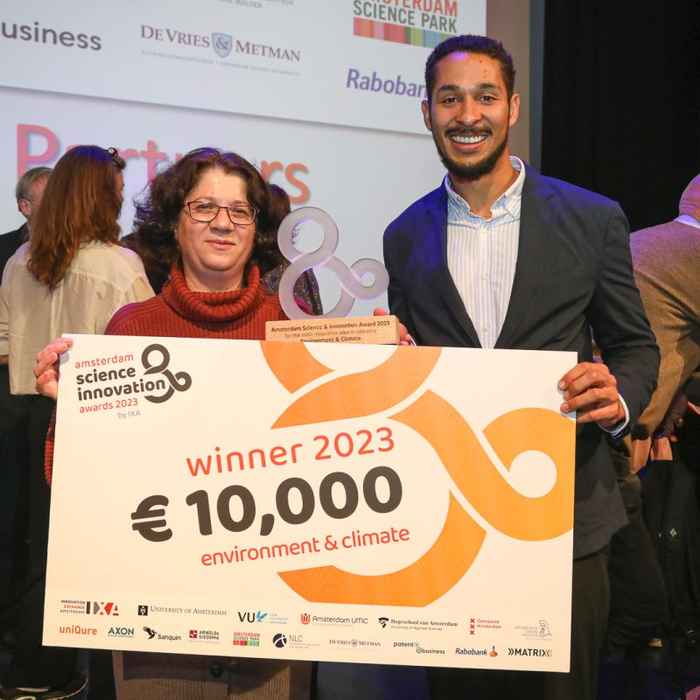Executive summary
Annual Report 2023
In 2023 we performed the formal 6-year evaluation of our research (2017-2022) according to the Strategy Evaluation Protocol (SEP) of the VSNU, KNAW and NWO. In a concerted effort by many of our staff, we compiled an extensive self-evaluation report assessing our research and reflecting on our strengths and weaknesses. I would like to thank all HIMS staff for their contributions during a fruitful two-day retreat in February and the many very constructive discussions that subsequently followed. The report was presented to the international SEP evaluation committee that visited our institute in November. We were quite satisfied with their preliminary findings and confidently await their final assessment.

In 2023 we saw many researchers at our institute acquiring external grants such as the ERC Synergy Grant for Prof. Joost Reek and colleagues at the University of Leiden and the Netherlands Cancer Institute to develop innovative therapeutic approaches to target glioblastoma, a deadly primary brain tumour. Many other grants underpin the relevance of our research for a transition to sustainability, such as those acquired by Prof. Bob van der Zwaan (next generation of batteries), Dr Chris Slootweg (hydrogen carriers and storage), Gert-Jan Gruter (sustainable plastics), Sonja Pullen (circular solar fuel) and Dr Stefania Grecea (green nanoparticle synthesis). AI is another focal point, illustrated by the novel Research Priority Area (RPA) in "Artificial Intelligence for Sustainable Molecules and Materials" (AI4SMM) that is funded by the UvA Faculty of Science and is led by Dr Bernd Ensing of our institute. Ensing also acquired an eScience grant for developing deep learning algorithms to generate and design new molecules.
In total, 12 young researchers obtained their PhD at our institute of which three received their doctorate with the distinction 'cum laude': Dr Minghui Zhou, Dr Leon Niezen and Dr Ruben Kranenburg. A number of 295 peer-reviewed publications resulted from our research, including 26 joint publications from collaborating HIMS groups, often involving interdisciplinary collaborations across the different HIMS themes.
We have seen a number of noteworthy changes in the HIMS staff. Our institute manager Marcel Bartels pursued his career elsewhere at UvA and was temporarily succeeded by Magdaleen Timmermans-Wiersma as interim manager. Prof. Arian van Asten was appointed full professor of Forensic Analytical Chemistry and On-Scene Chemical Analysis after having been affiliated with our institute as professor by special appointment since 2012. We also welcomed AMOLF researcher Esther Alarcón Lladó as professor by special appointment in Nano-electrochemistry and Renewable Energy Materials. Dr Alberto Pérez de Alba Ortíz was appointed assistant professor in Computational Soft Matter, affiliated both to our institute and the Informatics Institute. Finally, Dr Tomáš Šolomek was appointed as tenure track researcher in the Molecular Photonics group.

In 2023, HIMS researchers received notable awards and recognitions. Prof. Timothy Noël received a Chem. Soc. Rev. Pioneering Investigator Lectureship and was named Fellow of the Royal Society of Chemistry as well as president of the Flow Chemistry Society. Dr Ioana Ilie was elected president of APNet, the Assistant Professor Network Netherlands. Spin-off company Nano Hybrids of former postdoc researcher Olivier Lugier and Functional Materials group leader Dr Stefania Grecea received an Amsterdam Science & Innovation Award 2023. Associate professor Chris Slootweg was named Editor-in-Chief of the new journal Sustainability & Circularity NWO. PhD candidate Ida Fazlić won the national 3MT competition in her home country of Bosnia and Herzegovina, while Dr Eduard Bobylev was awarded a 2023 IUPAC-Solvay International Award for Young Chemists for his PhD research at our institute.
The valorisation of HIMS research and knowledge had several highlights worth sharing. Emphasizing the relevance of AI for chemical discovery, we co-organised the ChemAI event bringing together industry and academia. The Biocatalysis research group headed by Prof. Francesco Mutti contributed to the development of a novel industrial biocatalytic conversion process developed in a cooperation with the Italian companies Olon Group and Biosphere. Prof. Maarten van Bommel contributed to the development of an oxygen-free display case for exhibiting rare textile finds that has received the 2023 Innovator of the Year award of Museums + Heritage. We already mentioned the Amsterdam Science & Innovation Award 2023 for the newly established spin-off company Nano Hybrids. We are also proud of spin-off company SusPhos. Headed by our PhD graduate Dr Marissa de Boer, SusPhos won the 2023 MT/Sprout Challenger50 Award for ‘biggest market challenger of 2023’.
Finally, we would like to mention the successful accreditation of the new Bachelor’s programme in Science, Technology & Innovation that was developed by a team led by Dr Chris Slootweg. It offers education in the natural sciences from different points of view: theory, experiment, modelling and design thinking. Students will acquire basic knowledge from many fields (physics, chemistry, biology, earth & environmental science, mathematics, data science, and information science) that they will apply and integrate to master complex, real world challenges.